#julia lennon
Text

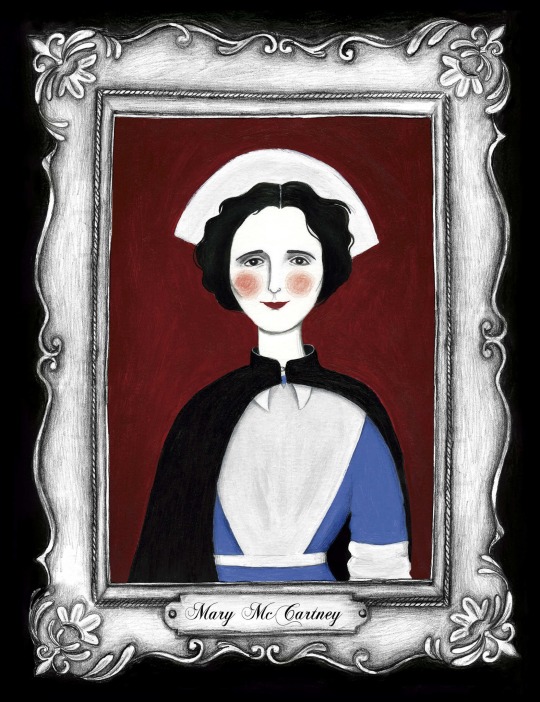
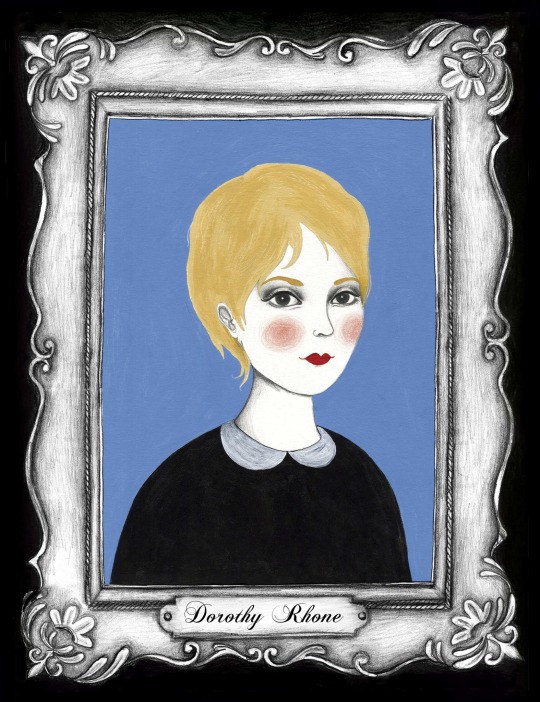
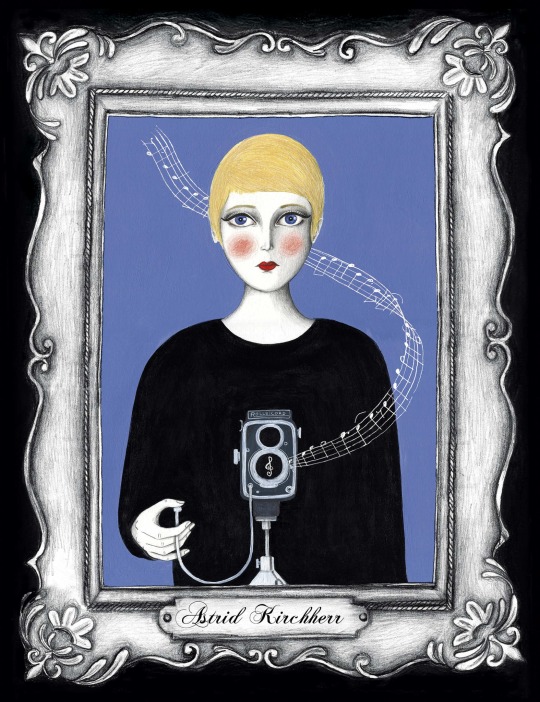



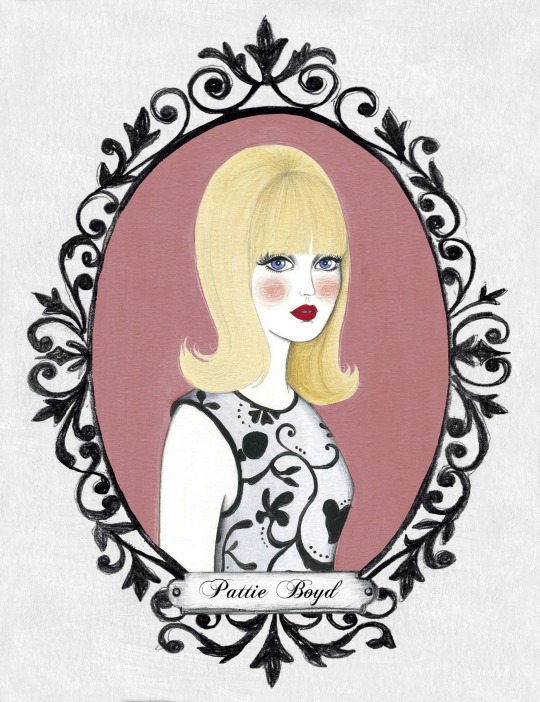
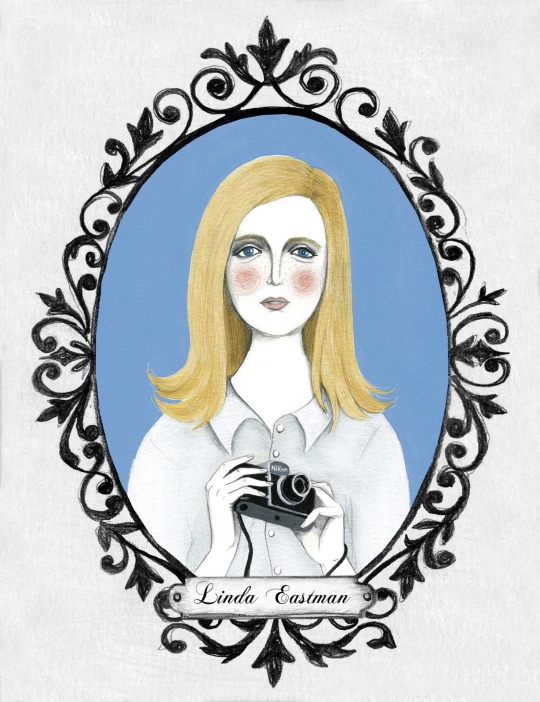

Important women in Beatles history
Illustrations by Marta Ponce
#Marta Ponce#Julia Lennon#mary mccartney#Dorothy rhone#astrid kirchherr#jane asher#cynthia lennon#maureen cox#pattie boyd#Linda Eastman#yoko ono
317 notes
·
View notes
Text
Paul will stay by John's side - a composition
»The original story about this was, I was reading about ›Death of John Lennon‹ in a newspaper. And one of the accounts was that the cop who took him to hospital after he’d been shot said ›Do you know who you are?‹ 'cause apparently that’s what they say to try and, you know, ›I'm Sally Burgess.‹ - ›Oh she’s not too badly off then.‹ But you know in John’s case it was particularly crazy 'cause, you know, it’s like a fan almost ›Do you know who you are?‹ ... and it always - oh my god - strangest remark that to me.
I told Carl about this. So we, that's what the nurse now says to the girl in bed as if - in the same way - ›Do you know who you are?‹ That's what she says.«

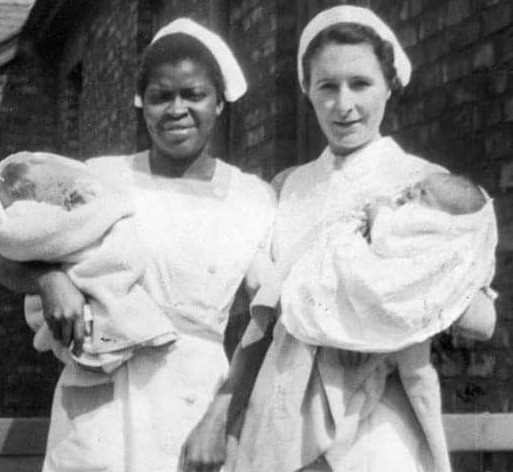
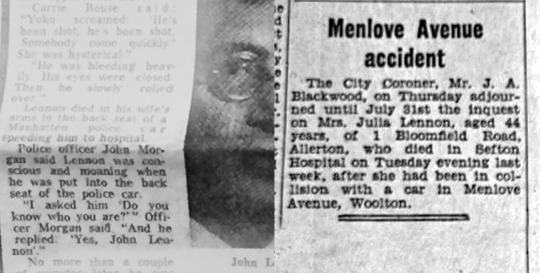

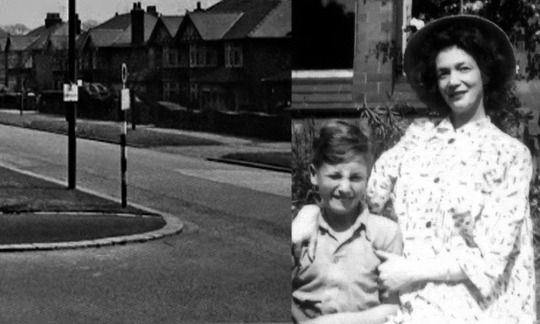
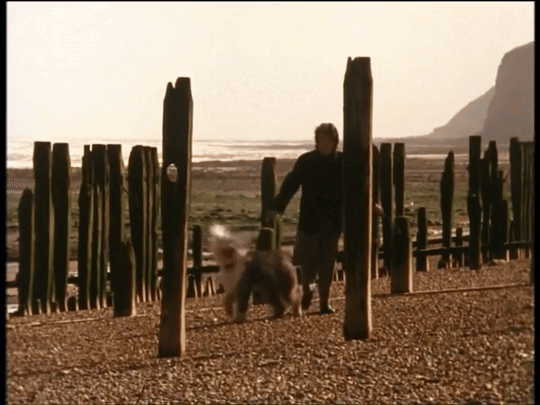
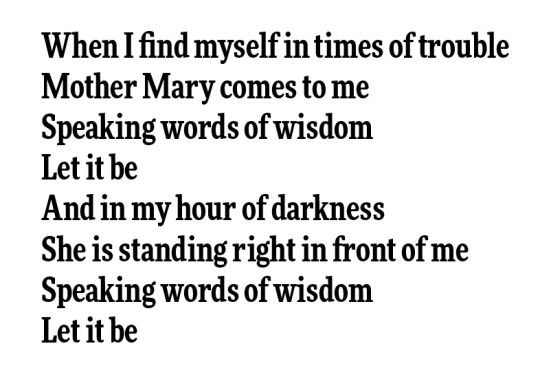
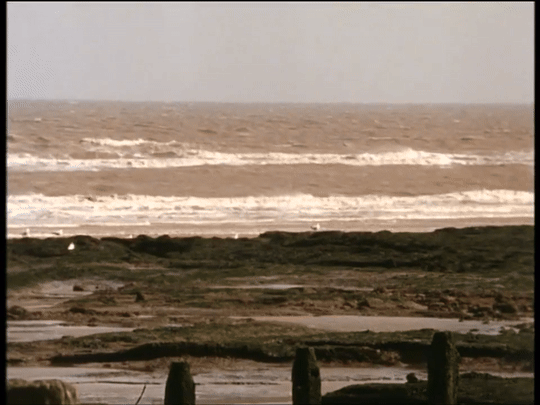
Tired of the hollow, the base, the untrue,
Mother, O mother, my heart calls for you!
Many a summer the grass has grown green,
Blossomed and faded, our faces between:
Yet, with strong yearning and passionate pain,
Long I tonight for your presence again.
Come from the silence so long and so deep;—
Rock me to sleep, mother, – rock me to sleep!
- the third stanza of
Rock Me To Sleep by Elizabeth Akers Allen
#love transcends death#I tried something#I hope this transfers what I wanted to say well enough#couldn't really put it into words#got into my head a little bit#the newspaper clipping about john's death is from the Liverpool Echo#I wonder if that might be the actual one Paul was referencing bc the accounts in the various articles differ#paul mccartney#john lennon#the beatles#john and paul#mclennon#liverpool oratorio#carl davis#julia lennon#mary mccartney#mothers#sally burgess#elizabeth akers allen#web weaving
86 notes
·
View notes
Text
Ladies and gentleman of the jury, this is my case.
(*next day* I definitely got a little ahead of myself with that statement, but I was so happy to get through a single paragraph of a mild example without getting lost in all the other falsehoods that it made me giddy. I do feel unstuck though, and that's worth a lot.)
--
This was supposed to just be a copy of my “Delusional Lewisohn” website post but I started talking and accidentally wrote what I've been trying to say for months.
It starts as my contrasting paragraph of “designing Lewisohn”—how he normally does things—so it's a little stiff and compact, but I spread out fast and while it's probably riddled with typos, this is what he does. It's just usually worse and about more nefarious things.
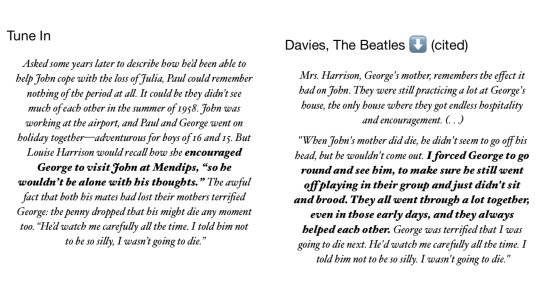
“It could be they didn’t see much of each other in the summer of 1958.”
In “A BEATLE DIDN’T SAY THAT!” one of my examples was Lewisohn very designedly making it seem like Paul wasn’t around for John after Julia’s death using a combination of an altered quote from George Harrison’s mother and the contextual phrasing surrounding it. Many know of Mrs. Harrison reassuring George that she wasn’t going to die, but Lewisohn cunningly alters the rest of her words and his supporting sentences to make Paul seem unaffected and distant after John’s mother’s death, and to paint George and Paul both as relatively unconcerned, when what Louise Harrison specifically says is that she sent George around to John’s to bring him over so that he could play guitar together with Paul and George, and that “they always helped each other.” For Lewisohn to surgically alter the words that he does quote, chop off the rest, and then sew them back up with misleading insinuations to create not only a false—but opposite—impression of the boys’ closeness after John’s loss is unforgivable.
TUNE IN – Lewisohn
Asked some years later to describe how he’d been able to help John cope with the loss of Julia, Paul could remember nothing of the period at all. It could be they didn’t see much of each other in the summer of 1958. John was working at the airport, and Paul and George went on holiday together—adventurous for boys of 16 and 17. But Louise Harrison would recall how she encouraged George to visit John at Mendips, “so he wouldn’t be alone with his thoughts.” The awful fact that both his mates had lost their mothers terrified George: the penny dropped that his might die any moment too. “He’d watch me carefully all the time. I told him not to be so silly, I wasn’t going to die.”
THE BEATLES – Davies (cited)
Mrs. Harrison, George’s mother, remembers the effect it had on John. They were still practicing a lot at George’s house, the only house where they got endless hospitality and encouragement. (…) “When John’s mother did die, he didn’t seem to go off his head, but he wouldn’t come out. I forced George to go round and see him, to make sure he still went off playing in their group and just didn’t sit and brood. They all went through a lot together, even in those early days, and they always helped each other. George was terrified that I was going to die next. He’d watch me carefully all the time. I told him not to be so silly. I wasn’t going to die.”
Lewisohn doesn’t outright say that Paul wasn’t around when Julia died, but he strongly infers it—deceptively altering and truncating a supposed-Mrs. Harrison quote—turning George's mom talking about how close the three were at that time and how they helped each other, into support for his inference that Paul barely saw John at this time. He then adds an introductory statement that makes it seem as if Paul was nowhere to be found, without actually saying that.
Yes, that's what I said. It is all lawyer-speak narration. Look at his first two sentences.
Asked some years later to describe how he’d been able to help John cope with the loss of Julia, Paul could remember nothing of the period at all.
It could be they didn’t see much of each other in the summer of 1958.
But we know the secret. We know what Mrs. Harrison actually said. And so does Mark Lewisohn, by the way.
Now, Lewisohn tells us that someone, somewhere, "some years later" asked Paul this "question" that I literally cannot even comfortably end with a question mark:
“Paul, describe how you were able to help John cope with the loss of Julia?”
Really?
I'm not going to lie, I don't believe him, but even if we give Lewisohn the benefit of the doubt— **excuse me i can't stop laughing. one sec**
—even if we give Lewisohn the benefit of the doubt that someone, somewhere, at some unnamed time, asked Paul to describe how he was able to help John cope with the loss of Julia, just what exactly would we expect Paul McCartney's answer to that to be? Honestly, try to imagine the look on Paul's face if he was asked to describe how he helped John to cope after Julia's death.
“Paul could remember nothing of the period at all.”
Did an appellate lawyer write this? No, this is contract law genius. I can find the holes in almost any contract, and Lewisohn's own words around a misused quote are a work of legal art. He never quite says what you think he said.
But on the quotes, themselves, Lewisohn swings for the fences. He is without shame or fear. He has no qualms about putting quotation marks around any old thing he wants to say. One cannot go too many pages without finding something that shocks the conscience.
These are not “mistakes.” They are a very deliberate cutting and pasting together of historical figures' words to make them mean something different—and often opposed to—what the speaker intended. He then surrounds the misquotes with carefully worded insinuations that don't really say what you thought they did.
THE ACTUAL MRS. HARRISON “QUOTE”
Davies is very good at weaving together information-heavy exposition together with the quotes from his interviews, and since he interviewed everyone himself, he can tell us a lot in his own words.
What that does for you and me is that we get the context from the guy who asked the questions and spent time with these people, and that makes it a lot harder to get away with using these quotes out of context. Like, before we even get to the direct quote from George's mom, Davies is telling us what she remembers from the time. And it's a lot. Because that's when the boys practiced at the Harrison's almost every day. And it's awesome because her memories almost always include what the boys were eating at the time. (Seriously.) Like, she'd “given them all beans and toast” a few months before Julia died when she heard John say to Paul, “I don't know how you can sit there and act normal with your mother dead. If anything like that happened to me, I'd go off me head.”
Davies also calls Mrs. Harrison “one of nature's ravers.” 🥹
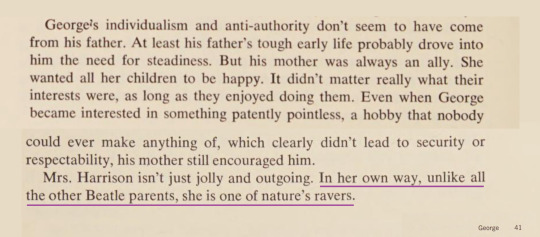
Everyone seems to agree that during this time the three were always at the Harrisons, and it's certainly the picture we get from Mrs. Harrison.
Davies is telling us all this, and leads into her direct quote by telling us what she “remembers.”
Mrs. Harrison, George’s mother, remembers the effect it had on John. They were still practicing a lot at George’s house, the only house where they got endless hospitality and encouragement.
And I trust Mrs. Harrison's memory because I am a mom, and I remember every trauma of my children's friends because I was the local Mrs. Harrison. We love those kids with all our hearts and they're so connected to our own kids that nothing happens to one without all of them feeling it. And the mom seeing it all. So how do we need Paul's answer to “Describe how you were able to help John cope with the loss of Julia?” when Mrs. Harrison has twenty stories, all with corresponding menus?
And Mrs. Harrison is saying that she sent George to get John out of his house so they could all play guitars together “in their group.” Not, George and John and no one knew where Paul was.
Where's Paul? Who could possibly know? “It could be they didn’t see much of each other”—but could it? It could be that Paul went ice skating in Sweden, EXCEPT HE FUCKING DIDN'T. Why are you lying to me in legalese in a Beatles biography?
“But Louise Harrison would recall how she encouraged George to visit John at Mendips” isn't true, but also isn't sane. If you pause and put as much thought into each sentence as was spent constructing them, you notice how many of them are patently ludicrous. Mrs. Harrison didn't encourage George to “visit” at Mendips because no child “visited” at Mendips. What are you even saying? To keep Paul and John away from each other you're talking nonsense. Visit? At Mendips? I can just picture John, Mimi and George sitting around having tea. But also, Mr. Lewisohn, those are not words that Mrs. Harrison said, and in fact, those words mean something completely different than the words she said.
What she said was she sent George over there “to make sure he still went off playing in their group and just didn’t sit and brood.”
And Nature's Raver Mom would see John not showing up like usual and would send her son out to make sure John knew he was wanted, and give him a little kick if necessary. She would want him in her house so she could feed him and make sure he was okay and to give him the comfort of playing music together with his friends.
They're the Beatles, and they got through it playing music. That's the real story, the true story, and a much better story.
And then she says “they all went through a lot together, even in those days, and they always helped each other.”
By cutting that out, leading into the quote you cut it from by speculating about where Paul was, and opining that maybe they didn't see each other much you are being purposefully deceptive and there simply is no other rational inference. None.
(I have tripled my website post now. I regret nothing.)
Let's take this baby home.
Because Mark Lewisohn completes the picture of John alone and ignored by George and Paul, and he does it by sneaking his own words into the mouth of George Harrison's dead mother.
I just want to make sure you got that. Like, let it sink in.
Mark Lewisohn changes Mrs. Harrison's actual words from “sit and brood” into “alone with his thoughts,” which further emphasizes the absolute absence of Paul and George. But he knows that John was not alone because he replaced Mrs. Harrison's words that said they were together playing music with his own words of John all alone. And then he has the nerve to even suggest that Paul and George are off together on holiday when John needs them most, while conjuring a parallel image of a traumatized John left separate and alone. (Except for his inner world.)
And I'm sorry, but I have to repeat it one more time: Lewisohn does all this by telling us that Louise Harrison said it. And although a lawyer could make a technical case that I am not being lied to here, I am.
Delusional Lewisohn is alive and well on my website. This has been Designing Lewisohn, signing off.
There's a lot, lot more and a lot, lot worse, but it's all of a piece. Not different in kind, just of degree. (But the degrees are significant.)
Tag 😏 @wingsoverlagos
#lewisohn#stop fucking lying#this isn't even a “bad” one#akom#fine tuning#it's time to see those “author interviews”#beatles#mark lewisohn#paul mccartney#john lennon#julia lennon#george harrison#louise harrison#guilty
29 notes
·
View notes
Text
Colin Hanton, re Mimi:
"In those early days we certainly only practised at Mendips on a very few occasions as a full six-piece group. Although she was more relaxed about things than you might expect, Mimi was concerned about the noise we made and possible complaints from either the neighbours or of distracting the student lodgers who were studying next door in the dining room. […] having said that, when we did Mimi was very hospitable, she always served us tea and biscuits in the tiny morning room next to the kitchen.
She had the ability to terrify everybody, a cross between a headmistress and a chief librarian. Yet she was also the first adult I recall who would hold a conversation with you as an equal. She didn't talk down to you or treat you like a silly teenager like a lot of parents would. She would talk to us about the group and the music and other subjects, about life in general. She paid us respect, for which, in turn, I respected her."
Colin Hanton, re Julia:
"He said he was going to see his mum and asked did I want to go with him? I was a bit surprised by this because up to this point no one in the Quarry Men had mentioned John's mum and I'd never thought to ask if he even had one. I just accepted he was living with his aunt for whatever reason. It wasn't unusual at the time - post-war - for a parent to be missing. Think about it: Eric's dad was missing, and Ivan's, both casualties of the war. In those days many families were missing people: not just dads but mums too, because of the Blitz. It was something you almost took for granted, so you didn't talk about it. It was private. Anyway I went along with John to visit his mother.
I was immediately taken with Julia: she was vivacious, full of fun and friendly, not like most mums I knew who could be a bit guarded when you first met them. […] We hadn't been there very long before she produced a banjo and began singing a song. I was fascinated: a mum playing a banjo and singing. In my experience this was a bit different. And she was really good."
"Apart from the church fete the only time I remember seeing Julia in the audience was when we played a club on Penny Lane. […] We could all see that John was really pleased when his mum showed up that night. the rest of us were too: for one thing her presence almost doubled the size of the audience. As I looked out from my drums she was sitting almost at the front, on the right-hand side of the stage quite close to where we were, while other members of the audience were dancing. John acknowledged her from the stage and played up to her quite a lot, as if he was performing just for her. Every time we finished a song, Julia clapped very loudly and enthusiastically which was great because not many others were. She was clearly pleased and proud to see and hear John performing with his group.
After we had finished, Julia came over and told us how much she had enjoyed our set. As ever she was great to be around: one of the few parents who appreciated what we were doing. Jim McCartney was another. However, there was something special and engaging about Julia. All these years later I still feel privileged to have known her and to have witnessed the musical bond between her and John. It was very loving and very strong."
from pre:fab! by Colin Hanton and Colin Hall
95 notes
·
View notes
Text

The spot where Julia Lennon was hit by a car and killed by an off duty police officer in 1958
#the beatles#george harrison#everythingisabeatlesreferance#john lennon#paul mccartney#ringo starr#mclennon#julia lennon#mendips
21 notes
·
View notes
Text

BEATLES photo of young John Lennon with his mother Julia Colorization Reblogged
TAG of BEATLES in my Tumblr
https://kichisaburo3.tumblr.com/tagged/BEATLES
- - - - - - - - -
Mono Photo Reblogged From :
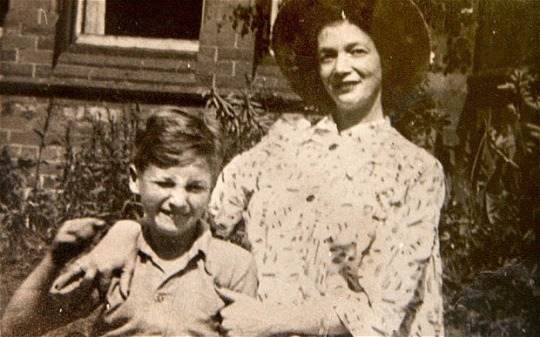
- - - - - - - - -
21 APR 2024 Sunday
15 notes
·
View notes
Text
#rock music#the beatles#john paul george and ringo#paul mccartney#john lennon#george harrison#ringo starr#polls#tumblr polls#fandom polls#my polls#random polls#julia lennon#mary mccartney#louise harrison#elise starkey#mother#Beatles mum
11 notes
·
View notes
Text
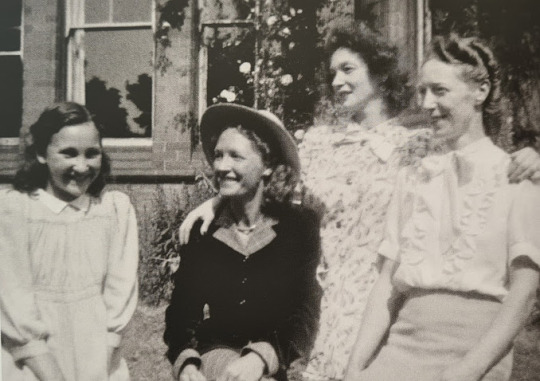
John's cousin Liela Birch (age 12), Aunt Harriet 'Harrie' Birch (Liela's mum), mother Julia 'Judy' Lennon, and Aunt Anne 'Nanny' Cadwallader.
45 notes
·
View notes
Text

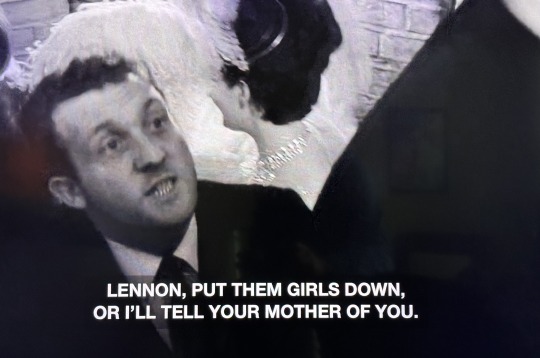
This seems like a strange bit of dialogue in 'A Hard Day's Night' given that most people who know anything about John Lennon know that his mother, Julia, was struck and killed by a 'learner driver' who was also an off-duty policeman when Lennon was 17 years old.
4 notes
·
View notes
Note
How do you know Mimi was abusive?
You must be joking. Please say you're joking.
Um okay, on the off chance you're not joking.
Here are a few of the things I remember off the top of my head
She didn't let John have friends for most of his childhood. He had to play alone in the backyard. She was more okay with him playing pretend as Alice than seeing other boys his age.
She also only let him go to the pictures once a year, on easter, that was it. Uncle George took him more, but once he died it was only once a year.
She put his dog down
She frequently told him he was fat
According to John's sister she literally kidnapped him at 5 because she really really didn't like her sister and thought she was a bad infuence
There's more, that's just off the top of my head.
9 notes
·
View notes
Text
Bad biographies: John Lennon's parents' divorce
One of the most discussed aspects of John Lennon's story is his parents and their lack of role in his life. John's broken family had a great influence over is personality and art, most notably his well-received Plastic Ono Band solo album.
John's parents did not divorce but they separated for 12 years.
Many people find this strange. Missing from discussion online is a sense of understanding to their position. I have heard people use this as evidence of Julia (John's mother) being irresponsible or erratic. In not divorcing her first husband her second family had to deal with a lot of stigma and other issues. I believe that this is either due to it not being explained well or absent from biographies and other sources.

John and his parents, Julia and Alfred. They seperated when John was about four, he lived with his aunt but would visit his mother often.
The short answer to this is that the 1969 Divorce Reform Act and the 1973 Matrimonial Causes Act created the divorce laws we would recognise today and there were many restrictions to divorce before that time.
Due to certain specifics of their situation and the law at that time Julia needed Alf to agree to a divorce. She was also greatly restricted by her financial situation and Alf being very difficult to locate.
During the sixties Alf would remarry. His second wife Pauline Jones would adapt his memoirs into a published book: Daddy Come Home: True Story of John Lennon and His Father by Pauline Lennon
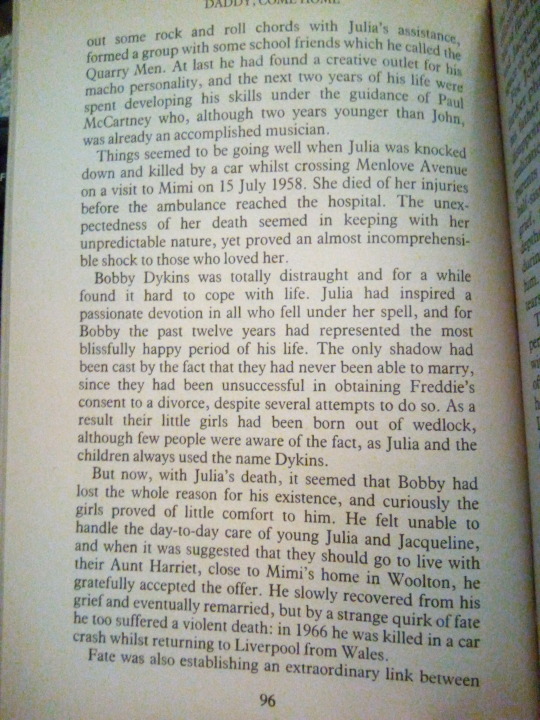
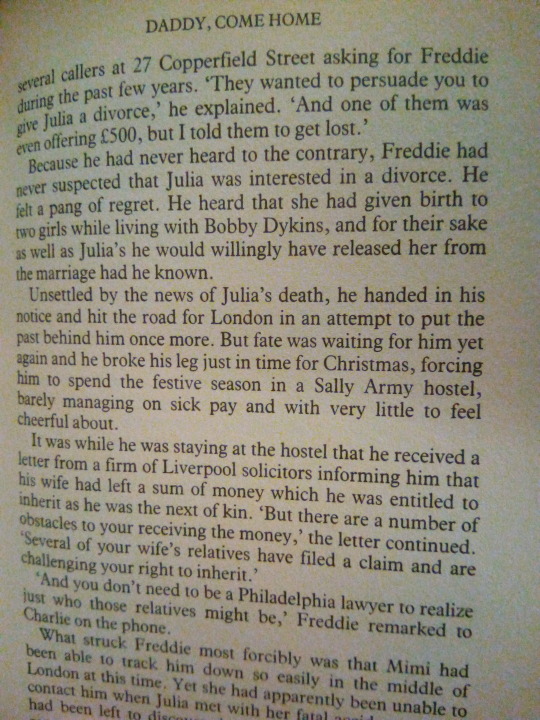
Pages 96 and 99. According to them it was Alf who was the barrier to divorce. They were aware of Julia's repeated attempts to divorce, although too late because she had died before then. Alf states that it never occurred to him that they would divorce and would have agreed had he known. He claims that his younger brother Charlie rejected the divorce on his behalf, even the offer of quite a lot of money.
You cannot take what they say at face value. Alf is writing the memoir to clear his name in the eyes of John and the public, a relationship he was trying to repair. Pauline wants to defend her husband from perceived criticism and reassure her sons that their father was a good man.
That said, they could have been defensive and blamed others but instead they present regret over what happened. The accuracy may be doubtful, but Alf is most likely to blame and regrets this.

In particular the impact on John and his family would have been the shame of John's younger sisters being born illegitimately. People cared if somebody was a bastard in those days and as a couple their relationship was considered "living in sin". It may have influenced John to marry his girlfriend when she became pregnant to protect her and the baby, a young marriage that became difficult for them both.
When Julia died her next of kin was Alf and the girls were taken in by relatives rather than their father. The couple had false birth certificates and disguised themselves as a married couple to secure housing. The stress and shame of their situation must have been difficult and likely would have impacted John.
#john lennon#the beatles#julia lennon#alfred lennon#alf#freddie#daddy come home#pauline lennon#divorce#seperation#law#family#parents#plastic ono band#mother#father
24 notes
·
View notes
Text
Shameless fic plug!
No matter how many funerals one witnesses, whether it be two or two hundred, the carpet is always too soft, the room too warm. The decor is never up to par, and the service is too stuffy. They play all the wrong music and tell all the wrong stories. All the wrong people preach and cry as if they cared before because regret really is stronger than love, isn’t it?
1958, Julias funeral.
John is not okay, Pauls doing his best? Lifes crumbling around them- but together? they'll be just fine.
pls give us validation pls :)
#the things we do for u harlots 😤😤😤#single moms who work two jobs who love their kids and never stop#my fic#the beatles#john lennon#paul mccartney#mclennon#ao3fic#julia lennon#mclennon fic
12 notes
·
View notes
Text
It was [the] aura of toughness and aggression and its association with rock ’n’ roll that attracted John Lennon to the guise of the Teddy boy. In his final year at Quarry Bank, John had dabbled in the fashion, adopting a “Tony Curtis” hairstyle and letting his sideburns grow. But it was not until he arrived at the Art College that he actually tried to represent himself as a Ted. There the fashion not only advertised his passion for rock, but also served as a way of camouflaging his comfortable Woolton origins and distancing himself from the bohemian pretensions (the “artiness,” as he called it) of his fellow art students. [...]
Lennon’s Teddy boy posturing could be dismissed as just that—mere posturing—if it were not so indicative of the spirit of romantic proletarianism that would influence his life in the years to come. Perhaps he simply reasoned that his failure in grammar school had earned him the right to identify with the world of the secondary modern. But John’s attempt to cultivate a working-class identity must also be seen in the context of his increasingly triangulated relationship with Mimi and Julia. Of the five Stanley sisters, Julia alone had failed to advance the family’s claim to middle-class status by means of marriage, education, and lifestyle. Instead, her weakness for waiters had led her first to marry Alf Lennon and then to abandon all claim to respectability by starting a second, out-of-wedlock family with her boyfriend Bobby Dykins in their Allerton council house. For John, the difference between a working-class identity and a middle-class one was thus personified by the difference between Julia and Mimi. And the choice posed by these two sisters was made much easier by John’s impression that Julia had paid no obvious price for her downward mobility. On the contrary: whereas Mimi’s frugal nature had only intensified since her husband’s death, Julia and Bobby Dykins appeared to live life as a series of small indulgences for which there was always cash on hand.
[—from Can’t Buy Me Love: The Beatles, Britain, and America, Jonathan Gould]
#can't buy me love: the beatles britain and america#jonathan gould#john lennon#julia lennon#the beatles#john and working-class identity
38 notes
·
View notes
Text
Paul: hey, what was your mom like?
John: young, funny, dead.
Paul: no, I mean before she died.
John: young, funny.
16 notes
·
View notes
Text
Episode One: Scene One
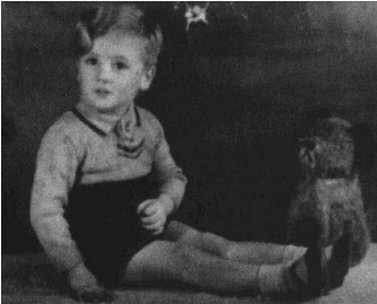
BLACK SCREEN SHOWING A DATE - 1943
SOUNDS OF a very young child screaming, banging, desperate on a window.
FADE IN:
SOUNDS OF hushing, sweet, motherly.
Child calms slightly.
INT. RUN-DOWN HOME – KITCHEN DOOR – MORNING - CAMERA FACES the window of the door looking out just above the bottom of the window. The child’s hands have stilled on the glass. A man with a duffle bag over his shoulder strides out of view.
JULIA: shush now, Johnny, daddy’s got to go, but mummy’s got you. Alright, love, that’s it, mummy’s here.
FADE OUT
#So#I know#John's dad just was in the merchant navy and then just gradually stopped sending letters and money#But little three year old John doesn't know or care about any of that#And we have limited time in this imaginary masterpiece series#So we're establishing that John's dad left when he was three and it was traumatic and we're moving on#John Lennon#Julia Lennon#The Beatles#Episode One#Obviously the picture is not mine
4 notes
·
View notes
Text
COPIED FROM FACEBOOK - I’ve not heard this version of the accident
REMEMBERING JULIA LENNON ❤
March 12, 1914 / July 15, 1958
Her temperament was much too flighty for her to be able to raise John traditionally - or so they said at the time and I have some serious questions, as to that - but she dearly loved John and he simply adored her
By the way, being incapable of raising a child properly and loving that same child are two different issues
Julia, much like John, was high spirited, impulsive, musical and may have simply suffered from mood disorders, which were completely misunderstood in 1958
She taught John how to play banjo and ukulele, staying in almost daily contact with John, despite the fact that John's Aunt Mimi (Julia's sister) was raising him
Julia was killed in an horrible motor vehicle accident on July 15th in 1958 when a vehicle by off duty policeman Eric Clague hit and killed her
Contrary to popular myth Clague was not drunk and was actually driving under the speed limit ... but was a unaccompanied driver with only only a learners permit, meaning he had to be accompanied by a fully licensed driver
He was later cleared of all charges, except for the issue with his driver's licence, claiming she had come out of nowhere, and that was backed up by witnesses
This was obviously the most painful moment of loss in John Lennon's life and was doubly painful because John's father, Alfred, had previously abandoned his family
This tragedy helped John and Paul McCartney to become even closer to each to each other, as Paul had previously lost his own mother to cancer
Mike Montana
The Beatles Universe Features Page ✅
13 notes
·
View notes